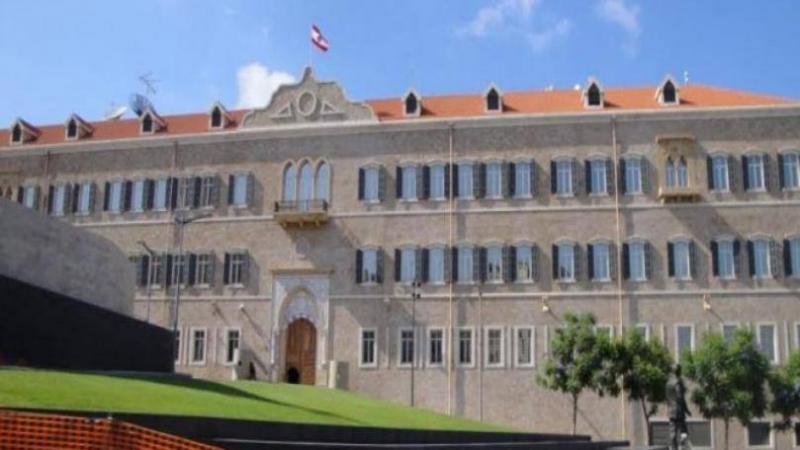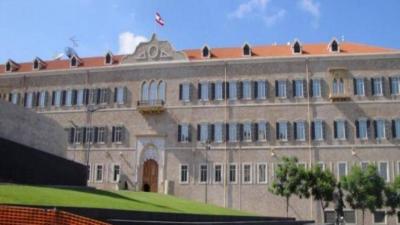Prime Minister Najib Mikati chaired a meeting today for the "Ministerial Committee tasked with addressing the implications of the financial crisis on public services" to discuss the open strike being carried out by employees in the public sector. Attendees included Deputy Prime Minister Saadeh Al-Shami, Minister of Education Abbas Halabi, Justice Minister Henry Khoury, Finance Minister Youssef Khalil, Minister of State for Administrative Development Najla Riachi, Minister of Social Affairs Hector Hajjar, Minister of Industry George Bouchikian, Minister of Interior Bassam Mawlawi, Health Minister Firas Abiad, Minister of Labor Mustafa Bayram, Minister of Public Works and Transport Ali Hamiyeh, Secretary General of the Council of Ministers Judge Mahmoud Makiyeh, Chairwoman of the Civil Service Council Nasrin Mishmoushi, and General Director of the Ministry of Finance George Maaraoui.
At the beginning of the meeting, Mikati emphasized that despite the difficult financial reality faced by the treasury, efforts are ongoing to provide all possible means of resilience and continuity for those working in the public sector, who are the backbone of the state. He stated that while the strike is legitimate, it is not a sustainable solution as it paralyzes state functions and halts revenues that could improve social conditions and increase salaries, thus keeping the situation stagnant.
He added that in the last meeting, a series of decisions were made that align with the financial reality and available resources, and today's meeting would explore new ideas to find a solution acceptable to all. However, he declared that meeting all demands at once is impossible and could lead to a broader collapse ; this is not within the current options.
At the conclusion of the meeting, Minister Bayram presented the resolutions, stating: "A meeting of the ministerial committee related to the management of public services was held urgently under the chairmanship of the Prime Minister, where a thorough scientific discussion occurred based on honesty and the financial reality of the state, free from populism and demagoguery. We unanimously confirmed the legitimacy of the demands of the public sector across all categories. However, meeting the full extent of these demands requires the provision of essential revenues, which can only happen by managing public facilities, and this requires the attendance of employees and the approval of the budget.”
He continued, stating that there had been communication with relevant authorities to approve the budget soon. Meanwhile, agreements were reached on the following principles and standards:
- Equality in dealing with employees in all public facilities without any discrimination or exceptions, and any exceptions made in previous days have been halted.
- Assurance of the operation of public facilities and services to citizens, which is primarily in the interest of the employees themselves to ensure the regular payment of salaries.
- Commitment to constructive scientific dialogue without giving employees or citizens one hand and withdrawing with the other.
- Confirmation of a comprehensive solution that will be through the approval of the budget after the Ministry of Finance committed to completing the financial tables related to securing all that was requested by the Finance and Budget Committee, aiming for its quick approval, in addition to the swift passage of laws that will secure a large and vital range of revenues in several important sectors.
Accordingly, as a temporary solution, the following was approved:
- Payment of the previously approved social assistance, which amounted to half a salary for May and June.
- Issuing an exceptional decree to provide a new social assistance equivalent to a full salary every month starting from July, benefiting those included in the previously issued cabinet decision regarding this matter.
- Considering the possibility of doubling salaries after the budget is approved and in light of the revenues that will be collected.
- Granting a daily transportation allowance for actual attendance of 95,000 LBP.
- Indicating the inclusion of a proposed law regarding the opening of additional credits to fund budget items, paying the differences for transportation allowances that were 64,000 LBP and were not paid to employees in general; these dues will be paid retroactively starting from last March.
- Linking all the above to a two-day attendance at least to ensure revenues and people’s interests.
It was noted that the educational sector, the Lebanese University, and the judges serving judicial shifts are subject to this attendance requirement and are currently on official holiday, hence the decision applies to them.
This was all tied to the employees' attendance according to what was stated, and discussions were held with many experts who emphasized the need to avoid the mistakes made previously through populist means. The current stance is responsible, aiming for non-discrimination among public sector workers and not favoring one sector over another, as this would cause confusion. We ask employees to bear their responsibilities in this context. The meetings remain open for continuous follow-up and further proposals for the benefit of all in this difficult situation.
In response to a question, Minister Bayram assured that the funding for the announced assistance is secured; a salary is currently guaranteed, but the primary funding will be through the budget that will allow a significant basket of revenues. There are very important revenue channels that do not directly affect citizens and were carefully selected to ensure high revenues, enabling us to later adjust and potentially double salaries, which is a right for a decent living for the employee who is a citizen of this state. The public sector has maintained the state, and we will not allow its collapse; we all share the responsibility for achieving this primary goal.
In response to another question, he stated that an exceptional decree based on these decisions will be issued starting from July 1, and increases will be given pending the budget approval. The President emphasized that we won’t settle for just one extra salary; depending on the availability of revenues, we will aim for more than double the salary.
Regarding the position of the Central Bank on this matter, he replied that it has no relation to the issue. When asked about the public sector's approval of these resolutions, he stated: "We are being honest; this is the committee's stance based on the data available to us. We do not make rosy promises but acknowledge that there is currently a crisis of revenues; there will be no salaries without revenues, and if employees do not return to work through the shifts we are calling for, there is a risk to the salaries. We are being frank with our families, our children, and our loved ones, and we will not abandon them. We have consulted with experts who warned us against making a misstep."
In response to a question, he noted that obtaining these benefits is linked to employee attendance. Minister Bouchikian described the resolutions as a transitional step, a bridge to the next stage we are working on, which is why the meetings have been kept open. "We do not want to enter a phase of inflation and deficit."




